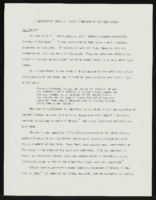Search the Special Collections and Archives Portal
Search Results

"A Demographic Impact of Basic Magnesium of Southern Nevada": manuscript draft by Roosevelt Fitzgerald
Date
Archival Collection
Description
From the Roosevelt Fitzgerald Professional Papers (MS-01082) -- Unpublished manuscripts file.
Text
Florence Lee Jones and John Cahlan Papers
Identifier
Abstract
The Florence Lee Jones and John Cahlan Papers (1929-1983) contain material created by the couple related to their work at the
Archival Collection
James B. McDaniel Architectural Records
Identifier
Abstract
The James B. McDaniel Records (1960-1978) comprise the plans and drawings created by Las Vegas, Nevada architect James McDaniel who worked independently as James Brooks McDaniel Architect (from 1960-1978) and with a partner as Moffitt and McDaniel Architects, Limited (during the 1970s). This collection includes materials from over 115 projects managed by McDaniel. Records include oversized architectural drawings, and files of architectural projects. McDaniel designed many University of Nevada, Las Vegas (UNLV) buildings, residential, commercial, and landscape designs for Las Vegas clients. Also included are business files of construction estimates, specifications, invoices, change orders, and correspondence.
Archival Collection
Fayle Family Papers
Identifier
Abstract
The Fayle Family Papers (1895-1998) document the family's personal and business interests in Goodsprings, Nevada and Las Vegas, Nevada. The collection contains mining documents, business records, and photographs from Leonard Fayle’s work with the Las Vegas Valley Water District, where he documented reservoirs, dams, and both abandoned and functioning mines. The photographs also include family members, vacations, and Southern Nevada fraternal organization pictures.
Archival Collection
Fayle Family Photographs
Identifier
Abstract
The Fayle Family Photographs depict the Fayle Family in Southern Nevada and California from 1888 to 1990. The photographs primarily include family photographs of Leonard Fayle, Anna Louise Trapnell Fayle, Leonard Fayle’s parents George Fayle and Jean Henderson Fayle, Leonard Fayle’s siblings George Arthur Fayle and Jean Nevada Fayle, and Leonard and Anna Fayle’s children Jane and Edward Fayle. The photographs also depict the Nevada towns of Las Vegas, Goodsprings, and Jean, including railroad operations, mining, milling, and hauling freight. The collection includes a leather-bound photograph album containing images of the Fayle Family and the Yount Family.
Archival Collection

James L. Hogan interview, March 11, 1978: transcript
Date
Archival Collection
Description
On March 11, 1978, collector Patty L. Baratti interviewed James Hogan (born April 6th, 1909 in Winton Place, Ohio) at his home in Las Vegas, Nevada. In this interview, Hogan talks about his time working with the telephone company in Arizona and moving to Las Vegas, Nevada. He discusses his time working on grazing rights and cattle ranching in Nevada and how planning went to ensure that farms were able to have land to graze their animals. He speaks about dealing with farmers, corporations, and the government and the frustrations he had to deal with before there were set laws about grazing. He also discusses the change from mainly family farms in Nevada to corporations owning much of the farmland.
Text

William McCullough interview, February 26, 1979: transcript
Date
Archival Collection
Description
On February 26, 1979, collector Pete Wahlquist interviewed William McCullough (born May 9th, 1905 in Kansas City, Missouri) at his home in Boulder City, Nevada. In this interview, Mr. McCullough discusses moving to Nevada and working on the building of Hoover Dam (Boulder Dam). He also speaks about Boulder City during the time of building the dam, as well as the growth he has seen happen in Las Vegas, Nevada.
Text

Nevada EPSCoR Women in Science and Engineering Records
Identifier
Abstract
The Nevada EPSCoR Women in Science and Engineering Records (1992-1998) consist primarily of budgets, staff resumes, program reviews and information, and correspondence pertaining to the Nevada Established Program to Stimulate Competitive Research (EPSCoR) Women in Science and Engineering (WISE) Las Vegas chapter located at the University of Nevada, Las Vegas. The records also contain newsletters, conference materials, and graduate assistant information.
Archival Collection
Aaron Williams Papers
Identifier
Abstract
Aaron Williams Papers (1965-1981) consist of scrapbooks, newspaper clippings, scrapbooks, certificates, newspaper clippings, reports, and programs. Many of the clippings and some of the correspondence contain references that give insight into the role of women in North Las Vegas and Clark County, Nevada during the late 1960s and early 1970s. The scrapbooks and newspaper clippings document Williams' career as well as issues he dealt with as councilman and commissioner. These issues include those related to community and infrastructure development, such as airports, sewage treatment plants, senior citizens, health, and urban planning as well as North Las Vegas and Clark county political activities during the late 1960s and early 1970s.
Archival Collection
